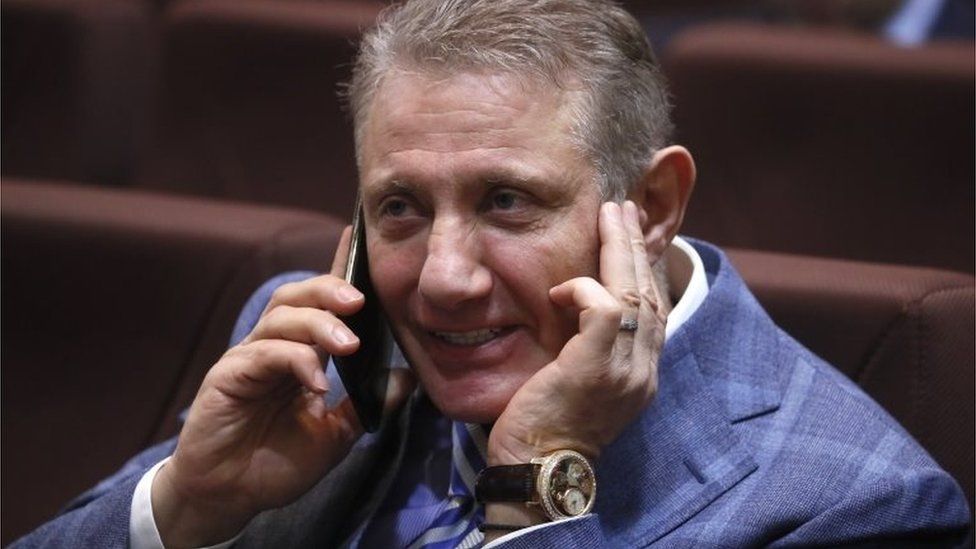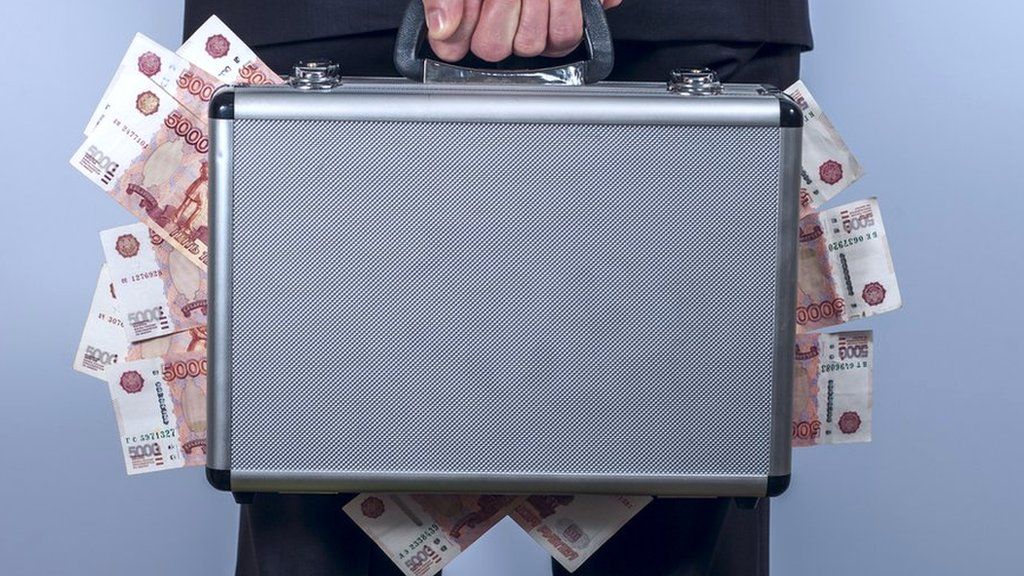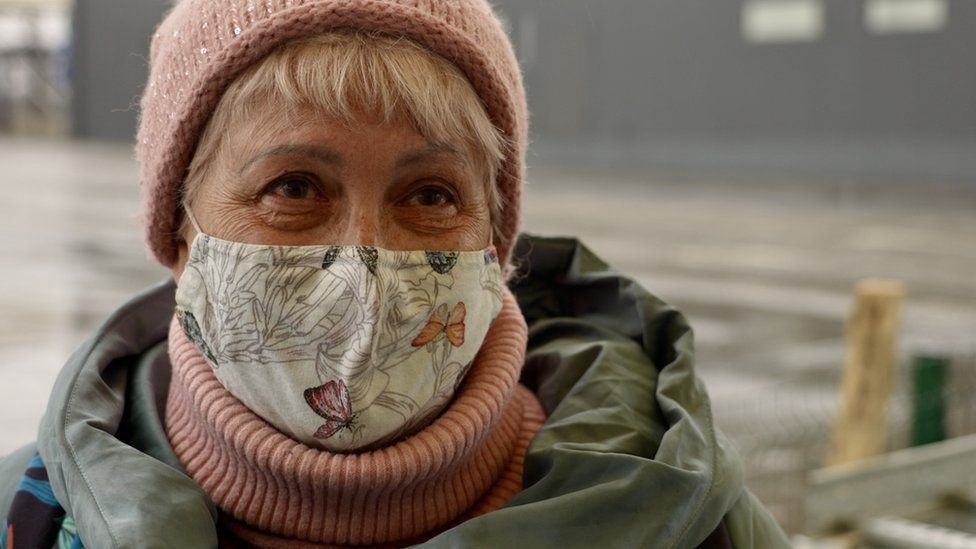This video can not be played
To play this video you need to enable JavaScript in your browser.
The UK has announced a series of sanctions against Russia after it ordered troops into two rebel-held regions of eastern Ukraine.
Five banks have had their assets frozen, along with three Russian billionaires - who will also be hit with UK travel bans.
Boris Johnson said Russia's actions amounted to a "renewed invasion" and the sanctions were a "first barrage".
He stressed these could be extended - but faced calls for tougher action now.
Russian President Vladimir Putin ordered troops into the regions of Donetsk and Luhansk on Monday, after recognising them as independent.
President Putin said the troops would be "peacekeeping" in the breakaway regions - a claim dismissed by the United States as "nonsense".
Mr Johnson announced the sanctions against Russian individuals and banks in a statement to MPs, after an emergency meeting early on Tuesday.
The effort comes as part of a co-ordinated Western response to the crisis, which has also seen the EU and US impose sanctions of their own.
The Foreign Office later announced the UK would also sanction Russian parliamentarians who voted to recognise the two-rebel held areas as independent last week.
The sanctions will be similar to those already imposed on the three billionaires, but could take weeks to enforce as new legislation will be required.
The department said that in the coming weeks British firms would also be prevented from doing business in the two breakaway areas - similar to Crimea, a region Russia illegally annexed in 2014.
It added "unprecedented" measures targeting the Russian financial sector had been prepared if Russia went further, and threatened to stop Russia issuing sovereign debt on UK financial markets if it did not "de-escalate".
Mr Johnson accused the Russian president of denying Ukraine's statehood, and "establishing the pretext for a full-scale offensive".
He said Russian tanks had already been "spotted" in the breakaway regions, amounting to a "renewed invasion" of Ukraine after the 2014 crisis.
This video can not be played
To play this video you need to enable JavaScript in your browser.
The EU has also announced plans to target members of the Russian parliament, as well as banks financing Russia's military.
Germany has also said it would freeze approval of the Nord Stream 2 gas pipeline to Russia - a move welcomed by Mr Johnson.
Labour leader Sir Keir Starmer welcomed British sanctions, but said the UK "must be prepared to go further".
He called for Russia to be excluded from the global SWIFT payment system, the banning of trading in Russian sovereign debt and action to prevent Russia "broadcasting its propaganda around the world", a reference to the RT news channel.
Sir Keir said he understood the government wanted to delay introducing some sanctions as a tactic to deter a Russian invasion of the rest of Ukraine, but without a "full set of sanctions now" President Putin would conclude that "the benefits of aggression outweigh the costs."
Senior Labour MP Margaret Hodge said there were "serious flaws" in the new sanctions regime, and expressed concern it would not affect "oligarchs close to Putin who do not hold an official position in a company".
Former Conservative leader Iain Duncan Smith and Liberal Democrat leader Sir Ed Davey were among MPs who welcomed the sanctions announced, but also urged the prime minister to go further.
Mr Johnson later said he thought further sanctions were "inevitable" given the situation in Ukraine.
He also suggested Russia should be stripped of hosting this season's Champions League Final.
Culture Secretary Nadine Dorries said she had "serious concerns about the sporting events due to be held in Russia" and would be discussing the subject with sport's governing bodies.
Russia's ambassador to the UK Andrei Kelin was told his country would "pay the price for its actions" after he was summoned to the Foreign Office.

Who and what are being targeted by UK sanctions?

Putin ally Gennady Timchenko is a billionaire hockey enthusiast with wide business interests in energy, transportation and construction via his Volga investment group.
The UK government has accused him of supporting a Russian policy of destabilising Ukraine through his association with Bank Rossiya, of which he is a major shareholder.
Igor Rotenberg, another close associate of President Putin, is the oldest son of Arkady Rotenberg and the majority shareholder in the Gazprom Drilling company.
Igor's uncle, Boris Rotenberg, has also been targeted. Mr Rotenberg is the co-owner - along with his brother Arkady - of the SGM group, the largest construction company for gas pipelines and electrical power supply lines in Russia.
The UK's sanctions notice says he is "benefiting from or supporting" the Russian state in his role in a key strategic sector.
Rossiya is a privately-owned bank, which also has stakes in a television company.
The Black Sea Bank is a Crimean bank and was created in 2014 after Russia annexed the region.
The General Bank is a financial institution which also operates in Crimea.
Promsvyazbank is a Russian state-owned bank, which the UK government says provides funding to Russia's military.
The BBC's Business correspondent Theo Leggett says the UK was not targeting the biggest banks but banks known to be used by President Putin's inner circle.


Are you in Ukraine? Are you or your family affected? Email haveyoursay@bbc.co.uk.
Please include a contact number if you are willing to speak to a BBC journalist. You can also get in touch in the following ways:
- WhatsApp: +44 7756 165803
- Tweet: @BBC_HaveYourSay
- Upload pictures or video
- Please read our terms & conditions and privacy policy
If you are reading this page and can't see the form you will need to visit the mobile version of the BBC website to submit your question or comment or you can email us at HaveYourSay@bbc.co.uk. Please include your name, age and location with any submission.

-
-
- 5 hours ago

-
World - Latest - Google News
February 22, 2022 at 11:58PM
https://ift.tt/Kd5lDZN
Boris Johnson announces UK sanctions against Russia - BBC News
World - Latest - Google News
https://ift.tt/KkUwBfN


No comments:
Post a Comment